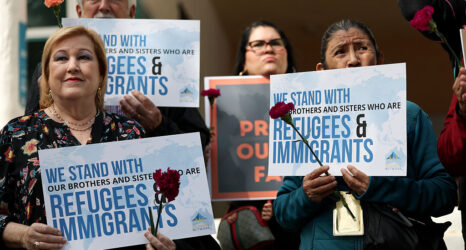In a disturbing irony, Poland’s decision to remove the “fetal defect” grounds for abortion will have a disproportionately negative impact on the lives and well-being of women with disabilities.
On Oct. 22, Poland’s Constitutional Tribunal ruled that Poland’s law permitting abortion on grounds of “a severe and irreversible fetal defect or incurable illness that threatens the fetus’s life” was unconstitutional. The decision triggered mass protests across Poland and uniting hundreds of thousands of people from all walks of life in their concern over the increasing restrictions on women’s rights.
This decision effectively bans access to safe and legal abortion for all pregnant persons, including women with disabilities. The Tribunal asserted that removing the “fetal defect” grounds for abortion would protect the rights of persons with disabilities.
To be sure, the intersection of abortion rights and disability rights is complex, especially in an overwhelmingly ableist world. Some disability rights advocates are concerned that laws that expressly permit abortion on grounds of fetal impairment codify the notion that disabled lives are worth less than non-disabled lives. Reproductive rights advocates are concerned that reforming abortion laws to remove fetal impairment grounds—or to expressly ban abortion in the case of a fetal impairment diagnosis—will result in less access to safe abortion and exacerbate related human rights consequences for those seeking to terminate their pregnancies, as we anticipate seeing in Poland as a result of this decision.
Too often, however, the diverse voices and perspectives of women with disabilities are left out of these debates. Yet, as people who experience ableism, sexism and other forms of discrimination and need to access the full range of sexual and reproductive health care, including abortion, they are uniquely positioned to address this debate’s complexity and bring essential perspectives to this ongoing debate.
Indeed, Polish feminists with disabilities have brought powerful dissent and insights to the ongoing protests and discussions about abortion in Poland—both on- and offline. In a recent webinar organized by our organizations, Artykuł 6 and Women Enabled International (WEI), together with CREA and Pełnoprawna, Polish feminists with disabilities stressed that pitting reproductive rights against disability rights discounts the perspectives of women with disabilities and undermines the human rights approach to disability rights as encapsulated in the UN Convention on the Rights of Persons with Disabilities (CRPD).
Furthermore, as WEI has documented, meaningful reproductive autonomy is a priority for women with disabilities all around the world, both as women and persons with disabilities, and access to abortion is an important part of that reproductive autonomy—and more broadly of their inherent and inalienable right to dignity.
But to exercise reproductive autonomy, people need both the legal right to make decisions about their bodies and lives and an enabling and non-stigmatizing environment in which to do so. Such an environment means that the full range of reproductive health care is fully accessible to all (including financially accessible) and that people can make reproductive health choices without stigma and fear.
It also means that pregnant people can receive unbiased information about a “fetal impairment” diagnosis at all times, including free from bias about the value of the life of a person with a disability, and that the rights of persons with disabilities living in the world are fully respected, protected, and fulfilled.

By removing one of the only remaining legal grounds for abortion in Poland while continually failing to ensure an environment that recognizes the dignity of persons with disabilities living in the country, the Constitutional Tribunal ruling fails on many levels to ensure reproductive autonomy or to meet Poland’s human rights obligations.
And in a disturbing irony, its decision will have a disproportionately negative impact on the lives and well-being of women with disabilities.
Why? Because women with disabilities typically are structurally hindered from accessing education and employment, resulting in lower incomes, so frequently cannot afford to travel abroad for abortion. Women with mobility-related disabilities face additional barriers, as the means of travel are often inaccessible. These inequalities are further exacerbated in the context of the current global pandemic.
Put most powerfully by Artykuł 6, the Constitutional Tribunal’s ruling “violates human rights and any respect for the decisions and needs of women, including women with disabilities. Instead, it imposes a limited vision of life and femininity that is contingent on subordination and coercion of women and girls with disabilities.”
Poland has clear legal obligations under the UN CRPD to protect the rights of persons with disabilities—including to protect the sexual and reproductive health and rights of women, girls, and pregnant persons with disabilities.
To meet these international legal obligations, Poland must:
- Ensure that people with disabilities have access to a full range of sexual and reproductive health care (including abortion where needed).
- Abolish laws that restrict the legal capacity of persons with disabilities to make their own decisions.
- Support persons with disabilities to lead autonomous, dignified and independent lives, and ensure that persons with disabilities can access quality education, meaningful employment, and social life.
- Ensure that persons with disabilities and their families have access to the range of supports and services they may need.
- Foster a climate where people with disabilities can participate freely as equal and valued members of society.
The clock is ticking.
You may also like:





